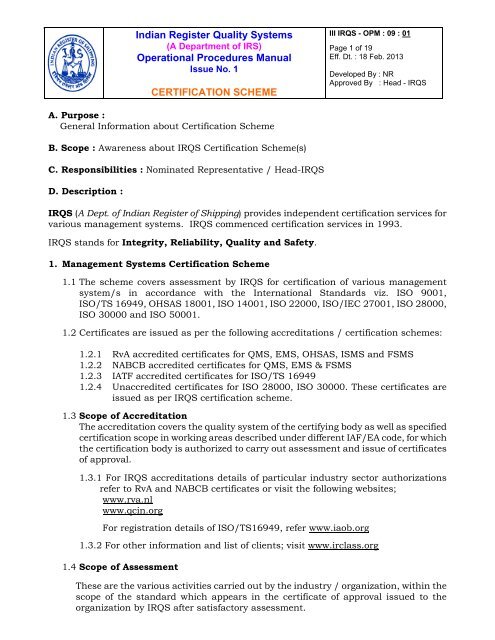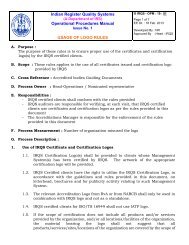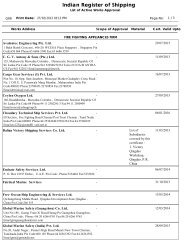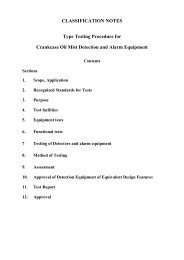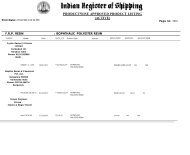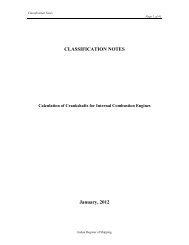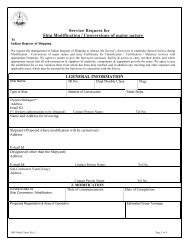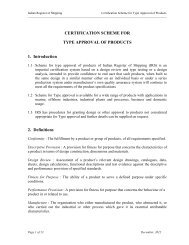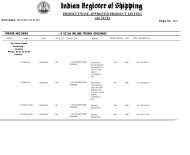Indian Register Quality Systems Operational Procedures Manual ...
Indian Register Quality Systems Operational Procedures Manual ...
Indian Register Quality Systems Operational Procedures Manual ...
You also want an ePaper? Increase the reach of your titles
YUMPU automatically turns print PDFs into web optimized ePapers that Google loves.
<strong>Indian</strong> <strong>Register</strong> <strong>Quality</strong> <strong>Systems</strong>(A Department of IRS)<strong>Operational</strong> <strong>Procedures</strong> <strong>Manual</strong>Issue No. 1CERTIFICATION SCHEMEIII IRQS - OPM : 09 : 01Page 1 of 19Eff. Dt. : 18 Feb. 2013Developed By : NRApproved By : Head - IRQSA. Purpose :General Information about Certification SchemeB. Scope : Awareness about IRQS Certification Scheme(s)C. Responsibilities : Nominated Representative / Head-IRQSD. Description :IRQS (A Dept. of <strong>Indian</strong> <strong>Register</strong> of Shipping) provides independent certification services forvarious management systems. IRQS commenced certification services in 1993.IRQS stands for Integrity, Reliability, <strong>Quality</strong> and Safety.1. Management <strong>Systems</strong> Certification Scheme1.1 The scheme covers assessment by IRQS for certification of various managementsystem/s in accordance with the International Standards viz. ISO 9001,ISO/TS 16949, OHSAS 18001, ISO 14001, ISO 22000, ISO/IEC 27001, ISO 28000,ISO 30000 and ISO 50001.1.2 Certificates are issued as per the following accreditations / certification schemes:1.2.1 RvA accredited certificates for QMS, EMS, OHSAS, ISMS and FSMS1.2.2 NABCB accredited certificates for QMS, EMS & FSMS1.2.3 IATF accredited certificates for ISO/TS 169491.2.4 Unaccredited certificates for ISO 28000, ISO 30000. These certificates areissued as per IRQS certification scheme.1.3 Scope of AccreditationThe accreditation covers the quality system of the certifying body as well as specifiedcertification scope in working areas described under different IAF/EA code, for whichthe certification body is authorized to carry out assessment and issue of certificatesof approval.1.3.1 For IRQS accreditations details of particular industry sector authorizationsrefer to RvA and NABCB certificates or visit the following websites;www.rva.nlwww.qcin.orgFor registration details of ISO/TS16949, refer www.iaob.org1.3.2 For other information and list of clients; visit www.irclass.org1.4 Scope of AssessmentThese are the various activities carried out by the industry / organization, within thescope of the standard which appears in the certificate of approval issued to theorganization by IRQS after satisfactory assessment.
<strong>Indian</strong> <strong>Register</strong> <strong>Quality</strong> <strong>Systems</strong> <strong>Operational</strong> <strong>Procedures</strong> <strong>Manual</strong>Issue No. 1 - Certification Scheme III IRQS - OPM : 09 : 01 Page 2 of 192. Management <strong>Systems</strong> as per international StandardsCertifications of following Management <strong>Systems</strong> Standards /Specifications are offeredby IRQS:2.1 <strong>Quality</strong> Management System (QMS) – ISO 9001The International Standards specify requirements for quality management systemswhere an organization needs to demonstrate its ability to consistently provideproduct that meets customer and applicable regulatory requirements and aim toenhance customer satisfaction through the effective application of the system,including processes for continual improvement of the system and the assurance ofconformity to customer and applicable regulatory requirements.2.2 ISO/TS 16949This technical specification, in conjunction with ISO 9001:2008, defines the qualitymanagement system requirements for the design and development, production and,when relevant, installation and service of automotive-related products.This technical specification is applicable to sites of the organization where customerspecifiedparts, for production and / or service, are manufactured.Supporting functions, whether on-site or remote (such as design centers, corporateheadquarters and distribution centers), form part of the site audit as they supportthe site, but cannot obtain stand-alone certification for ISO / TS 16949.2.3 Environmental Management System (EMS) – ISO 14001The requirement for an environmental management system is to enable anorganization identify its significant aspects and their impact, to develop andimplement policy and objectives, which take into account legal and otherrequirements to which an organization subscribes, and take decision to inform aboutsignificant environmental aspects to all the interested parties. It applies to thoseenvironmental aspects that the organization can control, that it can influence. Itdoes not itself state specific environmental performance criteria.The extent of application depends on factors such as the environmental policy of theorganization, the nature of its activities, products, services, location and theconditions in which it functions.2.4 Occupational Health and Safety management <strong>Systems</strong> (OH & SMS) –OHSAS 18001This standard gives requirements for an occupational health and safety (OH & S)management system, to enable an organization to control its OH&S risks andimprove its performance.
<strong>Indian</strong> <strong>Register</strong> <strong>Quality</strong> <strong>Systems</strong> <strong>Operational</strong> <strong>Procedures</strong> <strong>Manual</strong>Issue No. 1 - Certification Scheme III IRQS - OPM : 09 : 01 Page 3 of 19This standard is intended to address occupational health and safety of personnel andprocesses, rather than product and services safety.The standard is applicable to any organization that wishes toa) Establish an OH&S management system to eliminate and minimize risk toemployees and other interested parties who may be exposed to OH&S risksassociated with its activities.b) Implement, maintain and continually improve the OH&S management systemc) Assure itself of its conformance with its stated OH&S policyd) Compliance to legal and other requirements2.5 Food Safety Management System (FSMS) - ISO 22000Certification of an organization’s FSMS is one of the means of providing assurancethat the certified organization has implemented a system for the food safetymanagement of its processes, activities, products and services in line with theorganization’s food safety policy and the requirements of ISO 22000.It is applicable to all organizations, regardless of size, which are involved in anyaspect of the food chain and want to implement systems that consistently providesafe products.2.6 Information Security Management System (ISMS) - ISO 27001An Information Security Management System (ISMS) is a systematic approach tomanaging sensitive company information so that it remains secure. It encompassespeople, processes and IT systems.Certification of an organization’s ISMS ensures that the organization has a model forestablishing, implementing, operating, reviewing, maintaining and improving thesecurity of information including those of customer, held by the organization. Theimplemented ISMS ensure handling of overall business risks by implementation ofsecurity controls customized to the needs of the organization thus increasing theproductivity of the people and enhancing corporate image.2.7 Specification for security management systems for the supply chain –ISO 28000Supply chain describes an overall process that results in goods being transportedfrom the point of origin to final destination and includes the movement of the goods,the shipping data, and the associated processes as well as the series of dynamicrelationships. It involves many entities such as producers of the goods, logisticsmanagement firms, consolidators, truckers, railroads, air carriers, marine terminaloperators, ocean carriers, cargo/mode/customs agents, financial and informationservices, and buyers of the goods being shipped.ISO 28000:2007 outlines the requirements to enable an organization to establish,implement, maintain and improve a security management system, including thoseaspects critical to security assurance of the supply chain. These aspects include, butare not limited to, financing, manufacturing, information management and thefacilities for packing, storing and transferring goods between modes of transport and
<strong>Indian</strong> <strong>Register</strong> <strong>Quality</strong> <strong>Systems</strong> <strong>Operational</strong> <strong>Procedures</strong> <strong>Manual</strong>Issue No. 1 - Certification Scheme III IRQS - OPM : 09 : 01 Page 4 of 19locations.2.8 Ship Recycling Management System (SRMS) ISO 30000ISO/PAS 30000:2009 specifies requirements for a management system to enable aship recycling facility to develop and implement procedures, policies and objectives inorder to be able to undertake safe and environmentally sound ship recyclingoperations in accordance with national and international standards. Themanagement system requirements take into account the relevant legal requirements,safety standards and environmental elements that the ship recycling facility needs toidentify and comply with in order to carry out safe and environmentally sound shiprecycling.ISO/PAS 30000:2009 applies to the entire process: accepting a ship for recycling bythe facility; assessing the hazards onboard the ship; identifying and complying withany applicable notification and import requirements for ships to be recycled; carryingout the recycling process in a safe and environmentally sound manner; conductingrequired training; ensuring the availability of social amenities (e.g. first aid, healthchecks, food and beverages); storage and processing of materials and wastes from theship; waste stream and recycling stream management, including contractualagreements; and documentation controls for the process, including any applicablenotification of the final disposal of the vessel.2.9 Energy Management System (EnMS) ISO 50001ISO 50001:2011 specifies requirements for establishing, implementing, maintainingand improving an energy management system, whose purpose is to enable anorganization to follow a systematic approach in achieving continual improvement ofenergy performance, including energy efficiency, energy use and consumption.ISO 50001:2011 specifies requirements applicable to energy use and consumption,including measurement, documentation and reporting, design and procurementpractices for equipment, systems, processes and personnel that contribute toenergy performance.ISO 50001:2011 applies to all variables affecting energy performance that can bemonitored and influenced by the organization. ISO 50001:2011 does not prescribespecific performance criteria with respect to energy.ISO 50001:2011 has been designed to be used independently, but it can be alignedor integrated with other management systems.ISO 50001:2011 is applicable to any organization wishing to ensure that itconforms to its stated energy policy and wishing to demonstrate this to others, suchconformity being confirmed either by means of self-evaluation and self-declarationof conformity, or by certification of the energy management system by an externalorganization.3. Certification (Registration) of Management <strong>Systems</strong>3.1. Application
<strong>Indian</strong> <strong>Register</strong> <strong>Quality</strong> <strong>Systems</strong> <strong>Operational</strong> <strong>Procedures</strong> <strong>Manual</strong>Issue No. 1 - Certification Scheme III IRQS - OPM : 09 : 01 Page 5 of 19Organization, intending to obtain management system certification from IRQS, to fillup the questionnaire, indicating the scope of assessment (refer para 1.4) along withother details. An offer is made to the organization based on required man dayscalculated as per the details provided in the questionnaire and after ensuring thatthe declared scope of assessment is within the authorization of IRQS’s scope (referpara 1.3) of accreditation.3.2. Submission of DocumentsUpon acceptance of IRQS offer the Organization submits the ‘Order Acceptance andAgreement’ Form (application form of IRQS) indicating the scope of assessment (referpara 1.4) duly signed, along with the documentation establishing the relevantmanagement system, for review by IRQS auditors.For Public Sector Unit i.e. PSU, which usually form a client base involved in tenderingprocess, the issuance of Work Order / Purchase Order by these PSU’s are consideredequivalent document for Order Acceptance & deemed acceptance of the Terms &Conditions specified in Clause 4 of this document.In such cases details of certification requirements shall be provided through thedocument ‘Certification Scheme’.3.3. Assessment of DocumentsThe assessment of the documents may be done prior to the scheduled Stage I audit orduring the Stage I audit. It is preferable to receive and review the documents at least4 days prior to Stage I audit to provide a better focus on the scope of audit. Theadequacy of the management system documentation with respect to implementationis reviewed during the assessment and if found deficient appropriate comments arecommunicated to the auditee through Stage I report.The details of audit schedule are planned and these are submitted to theOrganization.3.4. Certification (registration) Assessment for the Management <strong>Systems</strong> is carriedout in 2 stages.a) Stage Ib) Stage IIThe activities of each are described as below:a) Stage I – The stage 1 audit shall be performed on-site to1. audit the client's management system documentation;2. evaluate the client's location and site-specific conditions and toundertake discussions with the client's personnel to determine thepreparedness for the stage 2 audit;3. review the client's status and understanding regarding requirements ofthe standard, in particular with respect to the identification of keyperformance or significant aspects, processes, objectives and
<strong>Indian</strong> <strong>Register</strong> <strong>Quality</strong> <strong>Systems</strong> <strong>Operational</strong> <strong>Procedures</strong> <strong>Manual</strong>Issue No. 1 - Certification Scheme III IRQS - OPM : 09 : 01 Page 6 of 19operation of the management system;4. Collect necessary information regarding the scope of the managementsystem, processes and location(s) of the client, and related statutory andregulatory aspects and compliance (e.g. quality, environmental, legalaspects of the client's operation, associated risks, etc.);5. review the allocation of resources for stage 2 audit and agree with theclient on the details of the stage 2 audit;6. provide a focus for planning the stage 2 audit by gaining asufficient understanding of the client's management system and siteoperations in the context of possible significant aspects;7. Evaluate if the internal audits and management review are being plannedand performed, and that the level of implementation of the managementsystem substantiates that the client is ready for the stage 2 audit.Stage 1 audit shall be carried out at the client's premises in order toachieve the objectives stated above.8. Stage 1 audit findings shall be documented and communicated to theclient, including identification of any areas of concern that could beclassified as nonconformity during the stage 2 audit.9. In determining the interval between stage 1 and stage 2 audits,consideration shall be given to the needs of the client to resolve areas ofconcern identified during the stage 1 audit. IRQS may also need to reviseits arrangements for stage 2.b) Stage II – AuditThe purpose of the stage 2 audit is to evaluate the implementation, includingeffectiveness, of the client's management system. The stage 2 audit shall take placeat the site(s) of the client. It shall include at least the following:1. information and evidence about conformity to all requirements of theapplicable management system standard or other normative document;2. performance monitoring, measuring, reporting and reviewing against keyperformance objectives and targets (consistent with the expectations inthe applicable management system standard or other normativedocument);3. the client's management system and performance as regards legalcompliance;4. operational control of the client's processes;5. internal auditing and management review;6. management responsibility for the client's policies;7. links between the normative requirements, policy, performance objectivesand targets (consistent with the expectations in the applicablemanagement system standard or other normative document), anyapplicable legal requirements, responsibilities, competence of personnel,operations, procedures, performance data and internal audit findings andconclusions.Stage II activity shall be scheduled within 90 days from the completion of the Stage Iactivity.3.5. Outcome of certification audit (Initial/ Renewal):
<strong>Indian</strong> <strong>Register</strong> <strong>Quality</strong> <strong>Systems</strong> <strong>Operational</strong> <strong>Procedures</strong> <strong>Manual</strong>Issue No. 1 - Certification Scheme III IRQS - OPM : 09 : 01 Page 7 of 19The outcome of a certification audit or renewal audit is decided based on the auditfindings including nature of non-conformities noted during the audit.There are four possible outcomes:i. Recommendation for certificationii. Recommendation for certification subject to corrective actions beingimplemented satisfactorily and / or effectivelyiii. Limited re-audit or follow-up visit at a later dateiv. No recommendation for certification, which usually means that a completere-audit is necessary.For (iii) and (iv) above, additional fee and expenses will be chargedNote: The certificate cannot be recommended in case of any unresolved nonconformitiesidentified during the audit.
<strong>Indian</strong> <strong>Register</strong> <strong>Quality</strong> <strong>Systems</strong> <strong>Operational</strong> <strong>Procedures</strong> <strong>Manual</strong>Issue No. 1 - Certification Scheme III IRQS - OPM : 09 : 01 Page 8 of 193.6. Non – ConformityNon- conformities shall be categorized by the auditors into Major and Minor.Characteristics of a major nonconformity are:i. The absence of a documented procedure to address a requirement of theapplicable audit criteria, when required.ii.iii.An extensive breakdown or the absence of evidence of effective implementationof a process and/or documented procedure required by the applicable auditcriteria.An inability to demonstrate compliance with a technical claim relative tomatters affecting product/service quality.iv. The absence of, or total systemic breakdown of, a management system elementspecified in the applicable audit criteria; or any nonconformity where the effectis judged to be detrimental to the integrity of the product, processes, or service.v. The absence of, or failure to implement and maintain, one or moremanagement system requirements; or a situation which would, on the basis ofobjective evidence, raise significant doubt as to the capability of themanagement system to achieve its policy and objectives.vi.A number of minor nonconformities against any one requirement of the auditcriteria represents a total breakdown of a system and therefore couldcollectively represent a major noncompliance. (Note: This condition usuallyrepresents 4 or more nonconformities.)Characteristics of a minor nonconformity are:i. A failure to fully satisfy a requirement of the audit criteria with adocumented procedure, when required.ii.iii.A breakdown in the effective implementation of a documented procedure inisolated incidents.Timelines for NC Submission and closureMajor NC Minor NCSubmission of Corrective Action 30 days 60 daysplanAcceptance of CAP by IRQS 60 days 60 daysFollow up visit 60 days 60 daysVerification & Closure Subsequent visit Subsequent visitNC during RecertificationBefore Certificate expiry dateExtension of NC period30 days3.7. Surveillance Audit:3.7.1 Surveillance activities shall include on-site audits assessing the certifiedclient's management system's fulfillment of specified requirements withrespect to the standard to which the certification is granted. Othersurveillance activities may includei. enquiries from the certification body to the certified client on aspects of
<strong>Indian</strong> <strong>Register</strong> <strong>Quality</strong> <strong>Systems</strong> <strong>Operational</strong> <strong>Procedures</strong> <strong>Manual</strong>Issue No. 1 - Certification Scheme III IRQS - OPM : 09 : 01 Page 9 of 19ii.iii.iv.certification,reviewing any client's statements with respect to its operations (e.g.promotional material, website),requests to the client to provide documents and records (on paper orelectronic media), andother means of monitoring the certified client's performance.3.7.2 Surveillance audits are on-site audits, but are not necessarily full systemaudits, and shall be planned together with the other surveillance activitiesso that the certification body can maintain confidence that the certifiedmanagement system continues to fulfill requirements betweenrecertification audits. The surveillance audit programme shall include, atleasti. internal audits and management review,ii. a review of actions taken on nonconformities identified during theprevious audit, c) treatment of complaints,iii. effectiveness of the management system with regard to achieving thecertified client's objectives, e) progress of planned activities aimed atcontinual improvement,iv. continuing operational control,v. review of any changes, andvi. use of marks and/or any other reference to certification.3.7.3 Surveillance audits shall be conducted at least once a year. The date of thefirst surveillance audit following initial certification shall not be more than12 months from the last day of the stage 2 audit.The date of the second surveillance audit shall not be more than 24 monthsfrom the last day of the stage 2 audit.3.8. Recertification Audit:A recertification audit shall be planned and conducted on-site to evaluate thecontinued fulfillment of all of the requirements of the relevant management systemstandard or other normative document. The purpose of the recertification audit isto confirm the continued conformity and effectiveness of the management systemas a whole, and its continued relevance and applicability for the scope ofcertification.3.8.1 The recertification audit shall consider the performance of the managementsystem over the period of certification, and include the review of previoussurveillance audit reports.3.8.2 Recertification audit activities may need to have a stage 1 audit in situationswhere there have been significant changes to the management system, theclient, or the context in which the management system is operating (e.g.changes to legislation).3.8.3 In the case of multiple sites or certification to multiple management systemstandards being provided by IRQS, the planning for the audit shall ensureadequate on-site audit coverage to provide confidence in the certification.The recertification audit shall include an on-site audit that addresses the following:
<strong>Indian</strong> <strong>Register</strong> <strong>Quality</strong> <strong>Systems</strong> <strong>Operational</strong> <strong>Procedures</strong> <strong>Manual</strong>Issue No. 1 - Certification Scheme III IRQS - OPM : 09 : 01 Page 10 of 19i. the effectiveness of the management system in its entirety in the light ofinternal and external changes and its continued relevance and applicability tothe scope of certification;ii. demonstrated commitment to maintain the effectiveness and improvement ofthe management system in order to enhance overall performance;iii. whether the operation of the certified management system contributes tothe achievement of the organization's policy and objectives.When, during a recertification audit, instances of nonconformity or lack of evidence ofconformity are identified, the IRQS shall define time limits for correction andcorrective actions to be implemented prior to the expiration of certification.3.9 Special auditsi. Extensions to scopeIRQS shall, in response to an application for extension to the scope of acertification already granted, undertake a review of the application anddetermine any audit activities necessary to decide whether or not the extensionmay be granted. This may be conducted in conjunction with a surveillanceaudit.ii. Short-notice auditsIt may be necessary for the IRQS to conduct audits of certified clients at shortnotice to investigate complaints, or in response to changes, or as follow up onsuspended clients. In such casesa. IRQS shall describe and make known in advance to the certified clients theconditions under which these short notice visits are to be conducted, andb. IRQS shall exercise additional care in the assignment of the audit teambecause of the lack of opportunity for the client to object to audit teammembers.iii. Suspending, withdrawing or reducing the scope of certificationIRQS has a policy and documented procedure(s) for suspension, withdrawal orreduction of the scope of certification, and shall specify the subsequent actionsby the certification body.IRQS shall suspend certification in cases when, for example,a. the client's certified management system has persistently or seriouslyfailed to meet certification requirements, including requirements for theeffectiveness of the management system,b. the certified client does not allow surveillance or recertification audits to beconducted at the required frequencies, orc. the certified client has voluntarily requested a suspension.Under suspension, the client's management system certification is temporarilyinvalid. In case of suspension the client refrains from further promotion of itscertification. IRQS shall make the suspended status of the certification publiclyaccessible and shall take any other measures it deems appropriate.
<strong>Indian</strong> <strong>Register</strong> <strong>Quality</strong> <strong>Systems</strong> <strong>Operational</strong> <strong>Procedures</strong> <strong>Manual</strong>Issue No. 1 - Certification Scheme III IRQS - OPM : 09 : 01 Page 11 of 19Failure to resolve the issues that have resulted in the suspension in a timeestablished by IRQS shall result in withdrawal or reduction of the scope ofcertification.Note: In most cases the suspension would not exceed 6 months.IRQS shall reduce the client's scope of certification to exclude the parts not meetingthe requirements, when the client has persistently or seriously failed to meet thecertification requirements for those parts of the scope of certification. Any suchreduction shall be in line with the requirements of the standard used for certification.3.10 Documents Issued to the Organization:Stage I Audit:• Audit plan• Stage I audit report including areas for concern and comments on manual• InvoiceStage II / Renewal / Surveillance Audit:• Audit plan• Audit report• Objective evidence report• Non-conformity report• InvoiceOn recommendation for grant of certificate of Approval, it is issued from Head Officealong with covering letter addressing excluded clauses and the logo artwork alongwith Usage of Logo guidelines.4. General Terms and Conditions4.1 Responsibility of IRQSIt is the responsibility of IRQS to provide Assessment and Certification in accordancewith the current issue of IRQS Document “Certification Scheme”. Please note that inmeeting its Policy of continual improvement of service, IRQS reserves the right tomodify the contents of “Certification Scheme”.4.2 Responsibility of Auditee Organization• It is the responsibility of the organisation to provide IRQS with all documents,information, facilities and changes as and when it takes place as necessary toenable IRQS to provide the services under these terms and conditions.• It is the responsibility of the organisation to provide accreditation bodies ofIRQS with all documents, information and visits as necessary to enableverification of audits carried out by IRQS.• It is the responsibility of Client Organization to visit IRCLASS websitewww.irclass.org on the updation of the Certification Scheme.
<strong>Indian</strong> <strong>Register</strong> <strong>Quality</strong> <strong>Systems</strong> <strong>Operational</strong> <strong>Procedures</strong> <strong>Manual</strong>Issue No. 1 - Certification Scheme III IRQS - OPM : 09 : 01 Page 12 of 194.3 Fees & Expenses• For agreements under Tender Documents: All terms & conditions will beapplicable as per agreed tender documents.• The fees payable and terms of payment are as detailed in IRQS letter enclosingthe quotation to the organisation. The basic charges for services requested arebased on the assumption that the information supplied by the organisation wasaccurate and complete.• Special Surveillance VisitsSpecial Surveillance Visits will be charged as per prevalent fees applicable at thattime.• Travel and Incidental ExpensesAll fees are exclusive of travel and incidental expenses which will be chargedextra at actuals.• Postponement – (Recovery of Administrative Costs)In case a scheduled audit is postpone, at the behest of the auditee, an amount of10% of the total Audit and Certification fee, shall be charged – for each of suchalterations – towards Administrative charges.• Cancellation – (Recovery of Administrative Costs)The application fees/administrative charges as mentioned in Annexue-1 of ourquotation for Certification Services, shall be payable in advance, prior toscheduling of the audit. In case of cancellation of audit by the auditee, theseapplication fees/ administrative charges will not be refunded.• Statutory TaxesAll fees and expenses quoted are exclusive of any statutory taxes which will becharged at the current rate, if applicable.• InvoicesInvoices will be submitted as soon as practicable, after the completion of anyassessment visit(s). As IRQS is a department of IRS, the invoices would be as perIRS invoice format.• PaymentAll payments should be made in the name of “<strong>Indian</strong> <strong>Register</strong> of Shipping”preferably by local Cheque/demand draft within 7 days of receipt of the invoice.Amounts remaining unpaid for more than 30 days from invoice date will be liableto interest at the rate of 15% per annum.The Certificate(s) of Approval cannot be released until full payment has beenreceived by IRS.4.4 TerminationEither party may terminate this request for assessment:-• By Notice‣ Three months written notice may be given by either party to the other.• By default‣ Immediately upon either party being notified by the other of any materialbreach of this request for assessment.‣ If either party goes into liquidation or a receiver or administrator isappointed for all or part of the undertaking thereof.• In the event of request for assessment being terminated whether by notice, default orotherwise the IRQS Certificate of Approval issued pursuant hereto shall forthwith
<strong>Indian</strong> <strong>Register</strong> <strong>Quality</strong> <strong>Systems</strong> <strong>Operational</strong> <strong>Procedures</strong> <strong>Manual</strong>Issue No. 1 - Certification Scheme III IRQS - OPM : 09 : 01 Page 15 of 19Terms & conditions related to ISO/TS 16949 Audita) the client shall notify the certification body of any changesLegal Status, 2) Commercial Status (e.g. Joint Venture, Subcontracting withother organizations), 3) Ownership Status (e.g. mergers and acquisitions), 4)Organization and management (e.g. key managerial, decision-making ortechnical staff), 5) Contract address or location 6) scope of operations under thecertified management system, 7) IATF subscribing OEM customer special status,8) Major changes to the management system and processesb) the client cannot refuse an IATF witness audit of the Certification Bodyc) the client cannot refuse the presence of a certification body internal witnessauditord) the client shall authorize access for the IATF representative or their delegatese) the client shall authorize the certification body to provide the final report to theIATFf) the only use of the IATF logo is as displayed on the certificate issued by theIRQS. Any other use of the IATF logo separately or not is prohibited.5 Maintenance of ApprovalCertificate of Approval is issued to the Organization on the understanding that therelevant Management system will be maintained at all times and for this purpose,IRQS will conduct Surveillance Audits in accordance with the IRQS Surveillance Planwhich will be notified to the Organization along with his Certificate of Approval.During Surveillance audit, it is ensured that all the relevant Management systemelements are examined at least once during the validity period of three years of thecertificate of Approval. The intervals between the initial certification audit and thefirst and second surveillance audit shall not exceed one year from the last date ofaudit. At the end of three years duration, if the Organization desires to continueCertification, Renewal Audit shall be carried out.6 Suspension, Withdrawal or CancellationThe Certificate of Approval shall be suspended, withdrawn or cancelled if it is foundthat:• The Organization does not agree for surveillance within the specified time frame• The Organization does not complete corrective action within the agreed timescale• The Organization fails to conform to the requirements of relevant standards• The Organization fails to comply with the financial requirements of theagreement of Certification• The Organization undertakes actions which may bring IRQS into disrepute• The Certificate or Logo is misused in any way.• The organization goes to liquidation or ceases to exist or ceases its activities forwhich it has been certified.• The activities of the organization are stopped by directives from court /statutory authorities.
<strong>Indian</strong> <strong>Register</strong> <strong>Quality</strong> <strong>Systems</strong> <strong>Operational</strong> <strong>Procedures</strong> <strong>Manual</strong>Issue No. 1 - Certification Scheme III IRQS - OPM : 09 : 01 Page 16 of 197 AppealsIt would be the Endeavour of IRQS to provide efficient and satisfactory services asdetailed in the Request Form. However, in case it is felt that any decision or theconduct of IRQS is unjust and prejudicial to any party, that party can appeal to IRQSand seek redressal. These appeals are to be sent to IRQS in writing.8 DisclaimerWhile this document is intended to provide guidance to prospective / existing clientsof IRQS and every effort is made to keep its content accurate and up to date, it shouldnot be construed to be comprehensive or conclusive in its contents and applicability.Assessment audit / Certification / Surveillance being activities that always call forauditor’s judgment based upon the facts and circumstances of each case / situations,this document cannot be construed to be binding IRQS in the scope, interpretationand applicability of its certification activities.
<strong>Indian</strong> <strong>Register</strong> <strong>Quality</strong> <strong>Systems</strong> <strong>Operational</strong> <strong>Procedures</strong> <strong>Manual</strong>Issue No. 1 - Certification Scheme III IRQS - OPM : 09 : 01 Page 17 of 19ROUTE TO MANAGEMENT SYSTEM CERTIFICATION OF AN ORGANISATIONIN ACCORDANCE WITH OTHER MANAGEMENT SYSTEM STANDARDSContact IRQSComplete questionnaire and returnReceive quotation from IRQSAcceptance of Quotation andOrganization makes application1. Submit signed Order AcceptanceAgreement including Terms & ConditionsForm2. Fees3. Documented Management SystemIRQS appoints assessment teamAudit (Stage I) includingAssessment of documents andvisit to organization’s premisesManagement SystemDocumentation ApprovalCorrective ActionMake amendmentsif requiredAssessment plan/standard/Scope/date/composition of team mutually agreedRequiring completeReassessmentCorrective ActionAudit (Stage II) Assessmentconducted on agreed date inLimited corrective actionrequiring no revisitLimitedre-assessmentconducted atmutuallyagreed dateRecommended for CertificationIRQS Assessment Team submitsreport to IRQS Head OfficeCertificate of Approval issued to Organizationvalid for three years upon acceptanceSubject toReceive Organization’sconfirmation on correctiveactionOrganization’s name registeredin IRQS list of certifiedOrganizations&RvA or NABCB Directory ofcertified Organizations(proposed)Surveillance Audits of IRQS
<strong>Indian</strong> <strong>Register</strong> <strong>Quality</strong> <strong>Systems</strong> <strong>Operational</strong> <strong>Procedures</strong> <strong>Manual</strong>Issue No. 1 - Certification Scheme III IRQS - OPM : 09 : 01 Page 19 of 19E. Revision History:Rev. EffectiveNo. DateDetails01 18.02.2013 Included the Energy Management SystemAmended 4.2Included in 4.6 ‘Use of logo not permitted on laboratorytest, calibration or inspection reports, as such reportsare deemed to be products in this context’.


